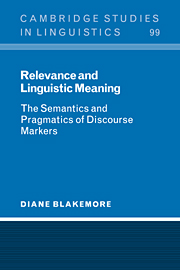5 - Relevance and discourse
Published online by Cambridge University Press: 18 December 2009
Summary
The location of discourse on the theoretical map
As I have said in my introduction, this book is about the two properties which have brought discourse markers into the forefront of pragmatics research. On the one hand, expressions classified as discourse markers are said to be non-truth conditional, which means that they play a role in discussions of the non-unitary nature of linguistic meaning and the relationship between semantics and pragmatics. On the other, they are generally claimed to signal connections in discourse, which means that they play a role in the discussion of how we account for the unity of discourse. So far the emphasis has been on the first property. However, the section on well (4.4) should have reminded us that I have yet to discuss the second.
In fact, it seems that discussions of the non-truth conditionality of discourse markers rarely make reference to their role in discourse, while discussions of role in discourse rarely include an investigation of their non-truth conditionality. Indeed, it seems that some writers whose concern is with their analysis within a discourse perspective classify expressions as discourse markers in a way which cuts across the distinctions that we have been discussing in the previous chapter. For example Knott and Dale (1994) include within their list of expressions they call cue markers both truth conditional expressions (for example, because, and, then) and expressions which are regarded as non-truth conditional (for example, but, furthermore, hence).
- Type
- Chapter
- Information
- Relevance and Linguistic MeaningThe Semantics and Pragmatics of Discourse Markers, pp. 149 - 183Publisher: Cambridge University PressPrint publication year: 2002



